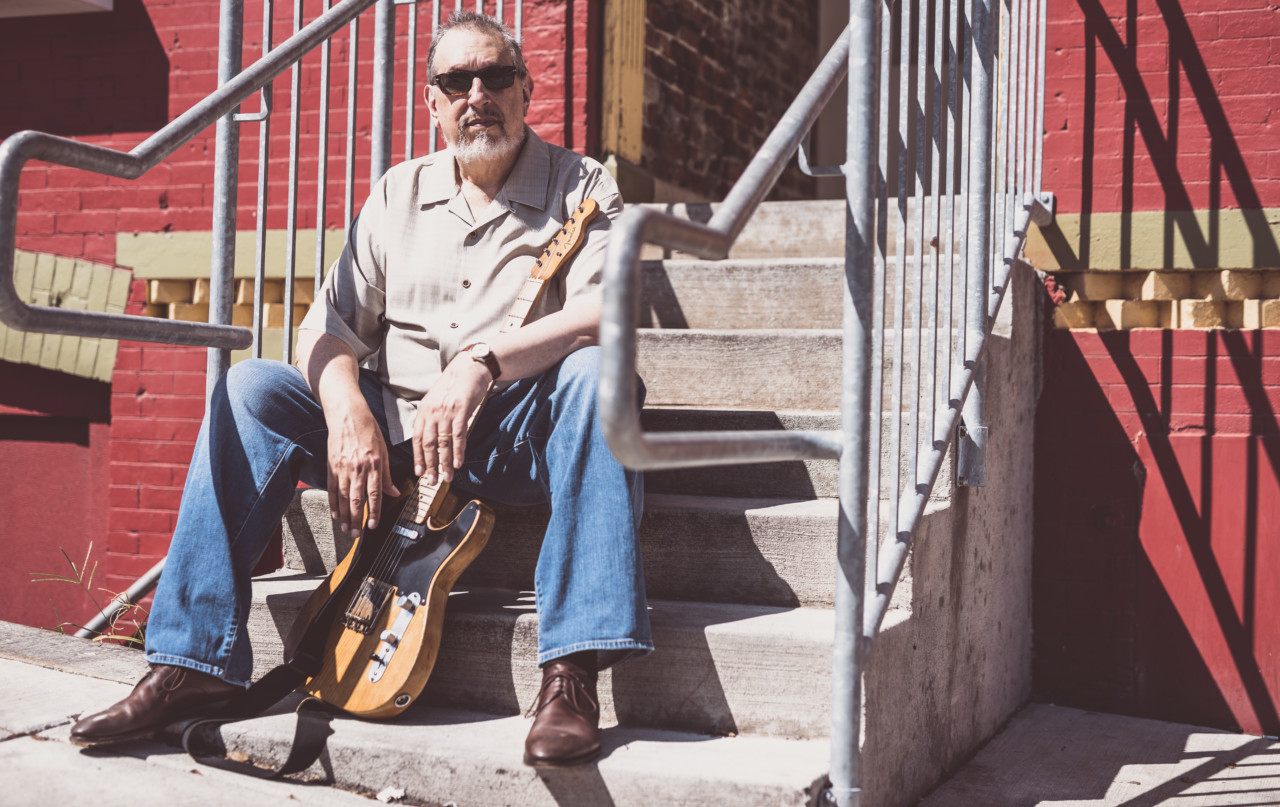By Iain Patience
“Worldwide domination,” says David Bromberg when I ask what he hopes to achieve with the release of his latest album, The Blues, The Whole Blues and Nothing but the Blues.
Bromberg sets the tone with his cheerful, deadpan New York Jewish comedic delivery before returning on a more serious note, confirming his belief that the new thirteen track release is the best bit of work he’s produced to date. “I’ve done albums that include all styles and genres for years. It was what I did. Now that’s being done by lots of people,” he says. “With this one I wanted to do something different. I wanted it all to move in one direction, so the blues it is.”
“Larry [Campbell] produced it, and it’s wonderful how he puts these things together in the studio. The thing about Larry is that when he hears, say, a band playing, he can pick out individually what each musician is doing – he’ll hear the guitar, he’ll hear the drummer, the bass, the whole thing – he can pick out it all, his mind isolates the patterns. Back at the beginning, he produced Karaoke albums,” he laughs, “so he got to know and understand what everyone was doing.” He is equally impressed, thankful and generous in his praise of engineer Justin Guip’s help with the project.
 Bromberg was one of those guys– an aspirant and super-fast learner back in the day in 1960s New York, playing most of the now legendary clubs and folk/roots music haunts. He recalls playing the Gaslight one night when Skip James was also on the bill, and catching an old buddy, B.B. King, play in California before returning to the Big Apple to spend a few weeks touring around Philly with Mississippi John Hurt. He worked with most of the greats of the period, including Bob Dylan and George Harrison, recording with them many times over the years.
Bromberg was one of those guys– an aspirant and super-fast learner back in the day in 1960s New York, playing most of the now legendary clubs and folk/roots music haunts. He recalls playing the Gaslight one night when Skip James was also on the bill, and catching an old buddy, B.B. King, play in California before returning to the Big Apple to spend a few weeks touring around Philly with Mississippi John Hurt. He worked with most of the greats of the period, including Bob Dylan and George Harrison, recording with them many times over the years.
Bromberg learned much of his guitar technique and skills from the late Rev. Gary Davis, a man who had a singular approach and whose reputation remains undimmed despite his passing over forty years ago, in 1973.
“The Reverend showed me that finger-picking style. He opened my ears and mind to subtlety. I used to take him to church where he’d be the preacher. So I became real interested in the music and the preacher’s delivery. I’d set off and attend other black churches around New York, listen to the preachers. I was open to everything going down. I learned so much that way. Take B.B. [King], I played with B.B. many times. B.B. could sure play; listen to his notes, his phrasing is always centre-stage. He always said he was trying to sound like the storefront-church preacher. I get that, B.B.’s phrasing is like a preacher’s.”
It’s impossible not to ask Bromberg what happened to him; in the 1980s and beyond, he seemed to disappear off the music radar. “I just felt burnt-out,” he instantly responds, going on to explain how he decided it was time to change his lifestyle and reflect a bit on what was happening.
“I’d spent about two years out on the road, non-stop touring and gigging right across America. [Bromberg’s sometime encore number, “New Lee Highway Blues,” echoes that same time and theme, he agrees.] Something had to give. I felt I had to find another way to live life. I’d been hanging around a violin store, became real interested and thought I might enjoy becoming a guy who can identify a violin, recognize its maker by looking at it and how it was built. I took a course, immersed myself in it all, and now have my own store in Wilmington, Delaware.”
 Bromberg adds that he spent around twenty years doing just that, only occasionally picking guitar, when needed, with pals. “It was a bit like, say, playing soft-ball with buddies at the weekend. You know how you just pitch in, have fun, turn away and forget it till next time, maybe a month or two down the road. I did that with my picking. I spent about twenty years just lying low.”
Bromberg adds that he spent around twenty years doing just that, only occasionally picking guitar, when needed, with pals. “It was a bit like, say, playing soft-ball with buddies at the weekend. You know how you just pitch in, have fun, turn away and forget it till next time, maybe a month or two down the road. I did that with my picking. I spent about twenty years just lying low.”
Bromberg is often known as the crown king, the Godfather of Americana back home in the USA. He shrugs the title aside, dismissing it as coming from everyone but the Americana world. “I’m a bluesman, always have been. Everybody calls me the Americana Godfather, except the Americana music people!” He laughs at the thought.
Bromberg may appear superficially dismissive of this title, but he’s also clearly rather proud. His personal arrangement, probably the definitive take on Jerry Jeff Walker’s wonderful song “Mister Bojangles,” has no doubt played a part in gaining the honor. For many years, Bromberg was Walker’s right-hand man in the studio and on the stage-weary road.
Ultimately, Bromberg’s iconic status is well deserved. This is a guy who knows no boundaries, and has mastered most musical genres in the course of a career that now spans over half a century. “I always try to make the music more accessible. I try to be open, to communicate with creativity. I enjoy being on-stage and also being in the studio. I’m up for all kinds of music. I never saw any reason to think I can’t play that. I’ll try anything.”
Preorder The Blues, The Whole Blues and Nothing but the Blues and connect with Bromberg via his website.








Be the first to comment!